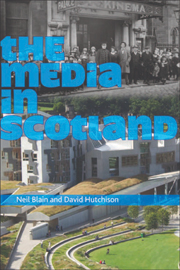Book contents
- Frontmatter
- Contents
- Preface
- Framing the Discussion
- The Historical Context
- Screen and Sound
- Themes and Futures
- 12 Gender, Spaces, Changes: Emergent Identities in a Scotland in Transition
- 13 Race and Ethnicity in the Media
- 14 Gaelic, the Media and Scotland
- 15 The Scottish Media and Politics
- 16 A View from Westminster
- 17 A View from Holyrood
- 18 Media Sport
- Select Bibliography
- Notes on Contributors
- Index
18 - Media Sport
from Themes and Futures
Published online by Cambridge University Press: 05 August 2013
- Frontmatter
- Contents
- Preface
- Framing the Discussion
- The Historical Context
- Screen and Sound
- Themes and Futures
- 12 Gender, Spaces, Changes: Emergent Identities in a Scotland in Transition
- 13 Race and Ethnicity in the Media
- 14 Gaelic, the Media and Scotland
- 15 The Scottish Media and Politics
- 16 A View from Westminster
- 17 A View from Holyrood
- 18 Media Sport
- Select Bibliography
- Notes on Contributors
- Index
Summary
Our first and last objection to the League is that they exist. The entire rules stink of finance, money-making and money grabbing.
(Scottish Sport)INTRODUCTION
The comment quoted above has a familiar ring to it, drawn as it is from a belief that commerce and greed are somehow to blame for despoiling the nature of sport. This particular quote comes from the Scottish Sport, part of a burgeoning sporting press of the 1890s railing against the formation of the Scottish Football League and the rise of professionalism in football. To any regular consumer of Scottish sports journalism – print and broadcast – the critical, almost self-righteous tone serves as a reminder that the Scottish media have rarely shirked their role as the arbiters of how sport in Scotland is meant to be organised and managed. The entrenched feel for the meaning of sport in Scotland's cultural history and among Scots is well documented (Jarvie and Burnett 2000) and its public consciousness is laid bare in its media. Above all, the passion for football, mainly but not exclusively among working-class men in the central belt of the country, has been ritualistically reflected in the voluminous coverage it receives on the pages of newspapers and the hours of coverage it warrants across broadcasting schedules. The national passion for sport, and the social and cultural cleavages that are pervasive within and through sport in Scotland, are – to use Michael Billig's phrase (1995) – ‘flagged’ on a daily basis by the Scottish media's similar obsession with covering the latest news, scandal and gossip for a ready and willing audience.
- Type
- Chapter
- Information
- The Media in Scotland , pp. 253 - 270Publisher: Edinburgh University PressPrint publication year: 2008



